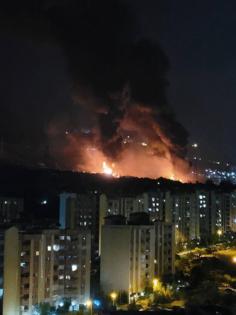Israelis embrace fight with Iran but worry about endless war
Published in News & Features
Shops and restaurants are shuttered. School is suspended. The airport is closed. Bleary-eyed residents trudge between shelters and bedrooms all night as bombs crash. The front page of the largest newspaper put it succinctly on Sunday: “History.”
Nothing has been the same in Israel since the Hamas attack that triggered the war in Gaza 20 months ago. But the last few days are on a different scale following the country’s unprecedented strike against Iran, which retaliated with ballistic missile barrages that destroyed entire city blocks — despite Israel’s vaunted air defense.
“Missiles that are taking down high-rises aren’t making people doubt the war; they’re convincing them that if Iran had the big bomb, it’d use it against us,” said Gad Yair, a sociologist at Jerusalem’s Hebrew University.
While there hasn’t yet been a public opinion poll, the strong anecdotal sense is that Israelis — at least Israeli Jews, who comprise 80% of the population — have rallied around the flag yet again for what could be a long, painful battle.
Given how much opposition Prime Minister Benjamin Netanyahu faces abroad over his conduct of the Gaza war, some non-Israelis may be surprised there isn’t more skepticism toward yet another military assault led by him — this one against a nation of 90 million people some 1,700 km (1,050 miles) away.
But fighting Iran is essentially a culmination of the war that began on Oct. 7, 2023, when Iranian-backed Hamas operatives stormed into Israel, killing 1,200 people and abducting 250.
That triggered Israel’s brutal assault on Gaza, but it also brought in Lebanon’s Hezbollah and Yemen’s Houthis, both Iranian proxies. Israeli officials and analysts have been saying all along that, once those militias are neutered, the fight has to be taken to Tehran.
And now it has — and despite a dozen deaths and 400 injuries caused by Iranian missile attacks, Israelis aren’t yet flinching.
Israelis are used to acting by the seat of their pants, said Yair, the sociologist. The nation’s achievements in Iran in just a few days — killing a score of top officials and scientists, curbing Tehran’s missile capacity, and damaging its nuclear sites — are a point from which to decide on next steps, he said.
Some ordinary Israelis say they’re fine with that.
“Iran is building a nuclear weapon and I’m willing to sleep in a bomb shelter for another month if that’s what’s needed to stop them,” said Kelly Bouskica, a 33-year-old nutritionist, as she grabbed a sandwich with friends outside a Tel Aviv food stand.
Restaurants have been ordered to shut for safety reasons but the popular Cafe Nordoy was open for takeout. As an act of public service, the manager declared that pastries would be free.
Israel’s streets are emptier than usual on Sunday but far from deserted. With the Home Command sending frequent updates on when to be near or in a protected area — the messages give a 12- to 15-minute warning — Tel Aviv’s beaches were populated by bathers enjoying abundant sunshine and 80F (27C) temperatures.
The fifth of Israel’s population made up of Palestinian citizens, Muslims and Christians may feel differently about Netanyahu’s assault on Iran.
There were some celebrations in Arab towns when missiles fell in the Tel Aviv area. On the other hand, an Arab town was also struck, leaving four people dead and solidifying a sense of shared fate.
Netanyahu’s critics have largely embraced — for now — his rationale that Israel had to act when it did because Iran was headed rapidly toward weaponization of enriched uranium, and that the ability of its proxies to help out has been degraded.
Still, many Israelis have been shocked at the destruction caused by Iranian missiles. News broadcasts are filled with scenes of local horror, homes destroyed, and the injured being ferried to hospital. With another 1,500 or so missiles estimated to be in Iran’s arsenal, there could be weeks of bombardment to come.
Some security and regional experts say the endgame is too vague. If Israel can’t destroy Iran’s nuclear program — key components of which are located deep underground — when and how can the conflict be resolved?
“We’re going to find ourselves in an endless war,” said Danny Citrinowicz, a fellow at the Institute of National Security Studies in Tel Aviv, who used to oversee Iran research in military intelligence. “The consensus in Israel on Iran, both from the left and the right, is worrying. Nobody is raising questions or challenging Netanyahu.”
Others say Israel needs to take stock of its accomplishments thus far and push for a diplomatic solution to Iran’s nuclear ambitions.
Israel “mustn’t become addicted to its own successes and, as a result, to a prolonged war,” wrote Yoav Limor in the right-leaning Israel Hayom newspaper. “It needs to look for an exit.”
_____
(With assistance from Galit Altstein, Alisa Odenheimer and Fadwa Hodali.)
_____
©2025 Bloomberg L.P. Visit bloomberg.com. Distributed by Tribune Content Agency, LLC.







Comments